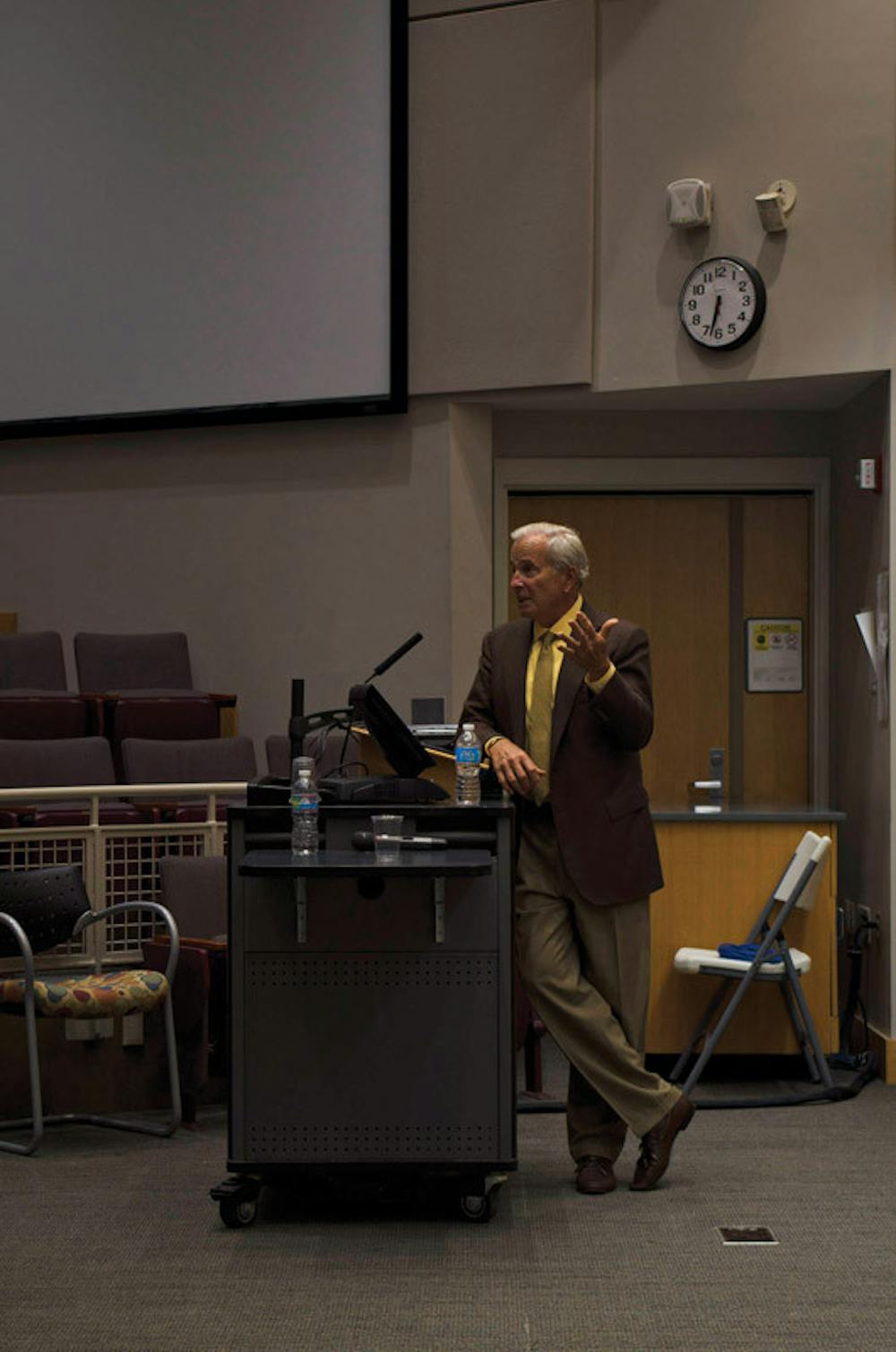“Let me take you to some planets I’ve visited and tell you some stories,” said Ken Auletta, long-time columnist for the New Yorker and author of 11 books, inviting his audience to travel with him to the Lehman Brothers offices and dinner dates with Rupert Murdoch.
Auletta, who spoke Monday evening in MacMillan 117, has written the Annals of Communication column for the New Yorker since 1993, profiled technology honchos like Bill Gates and Larry Page and studied the inner workings of Lehman Brothers, Microsoft, Google and the American welfare system for his non-fiction works.
He considers each of these subjects a different planet to be examined, he said, and as a reporter writing in these different orbits over the years, he has “bumped into” a truth he calls -“the human factor.”
Attention to this “human factor” comprised the majority of his lecture, detailing its deficiency both in modern news reporting and at companies like Google and Amazon. But at Lehman Brothers, Auletta observed a saturation of human factors like greed, panic and egoism as the bank unraveled.
Auletta explained the importance of the human factor in good reporting, as well as the need for time and space to unearth it.
“I found when you have the luxury of time and space, as you do writing books and writing for magazines like the New Yorker, you can’t reduce human beings to simple categories,” Auletta said, adding that he was lucky enough to experience this luxury, having spent two and a half years at Google, 10 days with Murdoch and long stretches of time with Gates in order to uncover significant truths.
“To understand people, I would argue we have to go beyond logic. We must take into account emotions, including things that are hard to measure,” such as pride, cowardice, fear, arrogance and insecurity, he said.
He attributes the absence of the human factor in most reporting to the lack of access and time to report the complex truths behind people and events, as well as a tendency to stereotype subjects.
Auletta also accused large businesses of neglecting a human factor when considering their employees and their consumers. “Google believed that engineers could measure everything, until they learned they could not measure things like fear: Why government fears big companies, why consumers fear for their privacy, why writers fear to protect their copyright, why dictators fear making all the world’s information available to all of their citizens.”
Auletta implicated Amazon and Netflix, as well, adding that these companies “think they can create algorithms to predict what movie or TV pilot will galvanize an audience. I doubt it.”
“In the end, no algorithm will be able to remove the risk from those decisions. A fickle public will always be mysterious, will always be king,” he said.
But he does not behold attention to the human factor as the sole model for good reporting and business decisions.
“I’m saying that the human factor is the part of the elephant that we look at least and the one that is hardest to gauge. Just as you can’t judge students on the results of multiple choice quizzes or black teenagers on whether they’re wearing a hoodie, so we have to be more judicious,” he said.
Questions from the audience concerned humility and objectivity in reporting.
Auletta said humility is fundamental, and the ability for a reporter to be a good listener assumes humility, adding that “Humility means that you’re willing to ask questions, because you assume you don’t know the answer.”
When an audience member asked him to distinguish humility from objectivity, Auletta said, “Objectivity is a false god. … Objectivity is something that is not quite achievable. You strive for fairness.”
Fairness is paramount to Auletta’s writing for his audience, and sometimes leads to a severing of his connections to the prominent subjects he profiles. Gates and Murdoch no longer speak to him, he said, as they feel betrayed by his writings.
Auletta used this moment to provide an additional piece of wisdom: Deciding one’s audience is fundamental to journalism.
“Is your audience the person you’re writing about, who’s cooperating so much and who you enjoy? Your job is to get underneath them and get in their head and understand them. And that’s an empathetic thing to do,” he said. “But when you’re sitting at that word process, you’re ruthless. Because they’re not your audience. Your audience is the reader, and you owe it to the reader to tell the truth as best you can determine it.”
The lecture was sponsored by the Andrea Rosenthal Memorial Lectureship Fund and the Department of Comparative Literature.

ADVERTISEMENT




